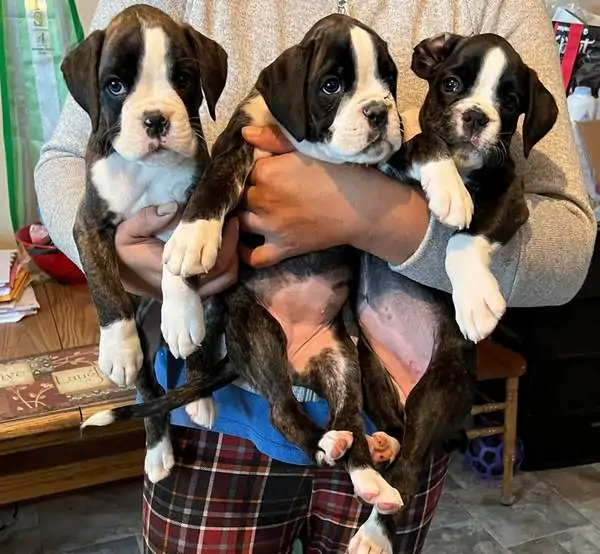Cute Boxer puppies Allentown Pennsylvania | What to feed a Boxer puppy?

The temperament of Boxer puppies
The temperament of Boxer puppy in Allentown can vary from individual to individual, but in general, Boxers are known for being playful, energetic, and affectionate dogs. They are known to be loyal and protective of their family, making them great watchdogs.
Boxer puppies are also known for their high energy levels and need for regular exercise and mental stimulation. They are intelligent dogs that respond well to positive reinforcement training methods and enjoy learning new tricks and commands.
As with all puppies, early socialization and training are essential for helping them develop into well-adjusted adults. It’s important to expose Boxer puppies to a variety of people, animals, and environments to help them learn how to interact appropriately with the world around them.
Overall, Boxer puppies can make great family pets for those who are willing to provide them with the exercise, training, and socialization they need to thrive.
What to feed a Boxer puppy?
Feeding a Boxer puppy in Allentown a healthy and balanced diet is crucial for their growth and development. Here are some tips on what to feed your Boxer puppy:
- Choose a high-quality puppy food. Look for a puppy food that is specially formulated for large breed puppies, as Boxers are considered a large breed. The food should have the right balance of protein, fat, and carbohydrates to support your puppy’s growth and development.
- Read the ingredient list. Make sure the food you choose lists real, whole-food ingredients as the first few items on the ingredient list. Avoid foods that contain fillers, by-products, or artificial additives.
- Follow the feeding guidelines. Feeding guidelines can vary depending on the brand and type of food you choose, as well as your puppy’s age and weight. Follow the feeding guidelines on the package and adjust as necessary based on your puppy’s individual needs.
- Offer multiple small meals per day. Boxer puppies have high energy needs and may benefit from multiple small meals per day, rather than one or two large meals. Aim for 3-4 small meals per day.
- Provide fresh water. Make sure your Boxer puppy has access to fresh, clean water always.
- Avoid table scraps. Table scraps and human food can be harmful to dogs and can lead to weight gain and other health problems. Stick to feeding your Boxer puppy their regular puppy food.
Remember to monitor your Boxer puppy’s weight and adjust their food intake as necessary to maintain a healthy weight. Consult with your veterinarian for specific feeding recommendations based on your Boxer puppy’s individual needs.
How to toilet train a Boxer puppy?
Toilet training your puppy should be quite a simple process, as long as you make the time and investment to get into a good routine.
Initially, you will have to build your routine around your puppy’s needs, and these are reliably predictable when they are very young.
You may find it useful to keep a record of when your puppy eats sleeps, urinates and defecates. A simple diary list will do. Repeat cue words like ‘wee wees’ and ‘poo poos’ or ‘be busy’ and ‘be clean’ while the puppy is actually urinating or defecating. Use different words for each action so that you will be able to prompt the puppy later on.
Equipment for toilet train a puppy
- Collar or harness
- Hands-free 3-4 foot non-retractable leash
- 15-foot non-retractable leash
- Two dog litter boxes or two frames that hold wee-wee pads
- Wee-wee pads
- Tasty small-sized treats
- Carpet cleaner for pet stains
- Mops and floor cleaner
When should I take my puppy outside?
Puppies need to urinate immediately after waking up, so you need to be there to take your puppy straight into the garden without any delay.
Eating its meal stimulates its digestive system, and puppies normally urinate within fifteen minutes of eating, and defecate within half an hour of eating (although this might vary slightly with each individual).
Puppies have very poor bladder control, and need to urinate at least every hour or two. They can urinate spontaneously when they get excited, so take your puppy out frequently if it has been active, playing or exploring.

